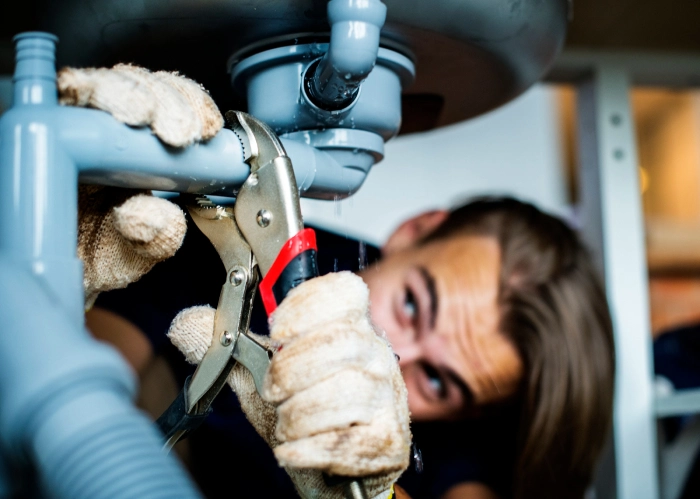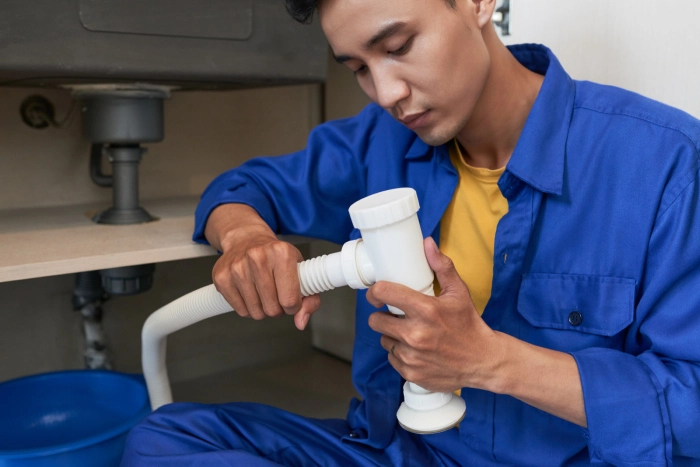
One of the challenges with plumbing problems is that many of them can go unnoticed until they become apparent and damaging. Some plumbing issues may arise from aging, wear and tear, and improper use and maintenance. In this post, we’ll discuss common plumbing problems and how to fix them.
An average household leak is estimated to be more than 9,000 gallons of water annually. Unresolved plumbing problems can be quite expensive and troublesome. At True Plumbing, our certified team has the knowledge and expertise to help you resolve various residential and commercial plumbing problems.
What are the Causes of Plumbing Issues
There are visible and non-visible causes of plumbing problems, and by taking preventive measures such as regular maintenance, proper insulation, and monitoring water pressure, property owners can help minimize the risk of plumbing issues. However, for specific plumbing issues or if you’re unsure about how to handle a plumbing problem, it’s best to consult with a professional plumber.
- Corrosion — Over time, metal pipes can corrode due to chemical reactions with water, leading to leaks and reduced water flow. Factors such as acidic water or improper pH levels can accelerate corrosion.
- Clogs and Blockages — The buildup of debris like hair, grease, soap scum, and mineral deposits can cause clogs in drains, pipes, and fixtures, resulting in slow drainage or backups.
- High Water Pressure — Excessive water pressure puts strain on pipes, fittings, and appliances, increasing the risk of leaks, bursts, and premature failure. It’s important to monitor and regulate water pressure to prevent damage to the plumbing system.
- Tree Roots — Tree roots seek out sources of water and can infiltrate underground pipes, causing cracks, blockages, and structural damage. This is especially common with older clay or concrete sewer lines.
- Freezing Temperatures — In colder climates, water inside pipes can freeze when temperatures drop, causing them to expand and potentially burst. If not addressed promptly, this can lead to water damage and costly repairs.
Common Plumbing Issues and How to Fix Them
While many typical plumbing problems might be inconvenient, they can also result in costly damage to your home’s plumbing systems. For instance, slow or clogged drains may first merely seem bothersome, but they may soon cause major harm.
1. Leaky Faucets
Leaky faucets are one of the most common plumbing issues. If left unfixed, they waste water, which can lead to higher water bills.
To fix a leaky faucet, start by turning off the water supply underneath the sink. Next, remove the faucet handle using a screwdriver or Allen wrench. Loosen the packing nut and extract the stem assembly. Inspect the washer and O-ring for wear or damage and replace them if necessary. Reassemble the faucet and turn the water supply back on. Test the faucet to ensure the leak is resolved. If the problem persists, consider seeking professional assistance.
2. Running Toilet
A running toilet can waste a significant amount of water over time. This problem is often caused by a faulty flapper valve or a problem with the fill valve.
To fix a running toilet, start by removing the tank lid and inspecting the flapper valve. Ensure it’s properly seated and not worn out; if damaged, replace it. Adjust the chain connecting the flush lever to the flapper valve for proper tension. Check the water level in the tank; adjust the float ball or cup if necessary to lower it. Flush the toilet to test adjustments. If the plumbing issues persists, consider replacing the fill valve or seeking professional assistance.
3. Low Water Pressure
Low water pressure can be frustrating when trying to take a shower or wash dishes. It can be caused by plumbing issues such as mineral buildup in pipes, a partially closed shut-off valve, or a problem with the water main.
To fix low water pressure, start by checking all faucets and fixtures to determine if the issue is isolated. Clean faucet aerators and showerheads to remove mineral deposits. Inspect the plumbing system for leaks and fix any found. If you have a pressure regulator, ensure it’s functioning correctly. If the problem persists, consider contacting a professional plumber to assess and address any underlying plumbing issues with the water supply or plumbing system.
4. Water Heater Issues
Problems with the water heater can range from insufficient hot water to leaks or strange noises. These plumbing issues may require professional attention to diagnose and repair.
To fix water heater issues, start by checking the thermostat settings and adjusting if necessary. Inspect the heating element or pilot light for faults and replace it as needed. Ensure the gas supply or power to the heater is turned off before any work. If problems persist, consult the manufacturer’s manual for troubleshooting steps or contact a licensed plumber for professional assistance in diagnosing and repairing the water heater.
5. Frozen Pipes
In colder climates, frozen pipes can be a common plumbing problem during winter months. If not addressed promptly, frozen pipes can burst and cause extensive water damage to a home.
To fix frozen pipes, first locate the affected area. Gently thaw pipes using a hair dryer, heating pad, or towels soaked in hot water. Keep the faucet open to allow water to flow and relieve pressure. Once the water starts flowing again, let it run for a few minutes to ensure the pipe is fully thawed. To prevent future freezing, insulate exposed pipes and consider letting faucets drip during extremely cold weather.

FAQs
What should I do if I have a leak?
If you discover a leak, it’s important to shut off the water supply to the affected area immediately to prevent further damage. Then, assess the severity of the leak and either attempt to repair it yourself or contact a professional plumber for assistance.
How can I prevent plumbing emergencies?
Regular maintenance, such as inspecting for leaks, cleaning drains, and checking water pressure, can help prevent plumbing emergencies. Additionally, avoid pouring grease, food scraps, and other debris down drains to prevent clogs.
What causes my drains to become slow or clogged?
A buildup of hair, soap scum, food particles, or mineral deposits often causes slow or clogged drains. Using drain covers, flushing drains with hot water, and avoiding putting non-biodegradable items down drains can help prevent clogs.
Conclusion
Schedule an appointment with True Plumbing to get the plumbing issues evaluated and fixed before a plumbing emergency causes property damage. Our experts can assist with anything from small-scale faucet repair to large-scale bathroom plumbing problems. We also provide gas line installation, garbage disposal installation, and emergency services without charging extra!

